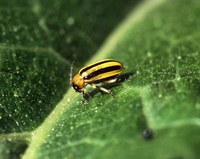Ozone masks plant's volatiles, plant eating insects confused
From Penn State Live
By A'ndrea Messer
April 2, 2013
UNIVERSITY PARK, Pa. -- Increases in ground-level ozone, especially in rural areas, may interfere not only with predator insects finding host plants, but also with pollinators finding flowers, according to researchers from Penn State and the University of Virginia.
"Ozone pollution has great potential to perniciously alter key interactions between plants and animals," the researchers said in a recent issue of Environmental Research Letters.
The animal tested in this case was the striped cucumber beetle, a predator of cucurbits -- cucumber, squash, pumpkin and melons. These insects dine on the plants from the moment they emerge from the ground and when fruit forms, they eat that as well.
"Insects detect odor with olfactory receptors located on their antennae," said Jose D. Fuentes, professor of meteorology, Penn State. "These receptors sense plant-emitted volatile organic compounds in very small amounts -- as low as six molecules hitting an antenna."
Read the full story on Penn State Live

